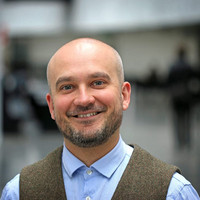Hello there, Francisco Vilaplana!

Meet Francisco Vilaplana, Professor of Glycoscience at KTH, who wants us to pay more attention to Complex carbohydrates – possibly the most diverse biomolecules that exist.
“My research deals with the biochemistry of complex carbohydrates, which are one of the fundamental building blocks of life. Complex carbohydrates, also known as polysaccharides, are natural polymers built by small sugar molecules as building blocks, which are responsible for essential metabolic and structural processes in life sciences.”
Polysaccharides constitute fundamental dietary components providing energy to all living organisms. They also form dietary fibres, with important health benefits on our gastrointestinal tract and on our gut bacteria. Moreover, polysaccharides such as cellulose, hemicelluloses and pectin provide structural stability in plant cell walls and are important components in wood.
“In my research we look at the molecular structure of complex carbohydrates, mainly from plants but also from other living organisms, and their supramolecular assembly in their cell walls. We use this fundamental information for the structure-driven design of biorefinery processes to convert these biomass carbohydrates into functional bioproducts using biocatalysis. We have two main application areas, functional materials and nutritious food for improved health.”
What motivates you as a researcher?
“I would say both curiosity and the possibility to make an impact on our health and the health of our planet! Complex carbohydrates might be the most diverse biomolecules that exist, but somehow they have gathered less attention compared to other essential biological molecules such as proteins or nucleic acids.”
“Understanding the molecular diversity of complex carbohydrates, and how this structural complexity influences many daily processes, such as the way we digest our food or the way plants and wood are formed and have such amazing material properties, is truly fascinating.
There are carbohydrates in the food we eat and the materials we use daily. Understanding them better can have a huge impact on the environment and human health.
“Our fundamental research on the polysaccharides on wood can lead to novel functional and biodegradable bio-based materials replacing fossil-based plastics,” Francisco Vilaplana says.
“On the other hand, food and dietary habits have a large influence on human health. The occurrence of chronic diseases such as diabetes, obesity and cardiovascular diseases is dramatically increasing in the Western World, where food habits have a significant role.”
The digestibility and bioavailability of carbohydrate-rich foods is directly related to their molecular structure. According to Francisco Vilaplana, most of the dietary fibres are insoluble and they end up discarded in many food related processes, such as the refining of cereal grains, or the processing of fruits and vegetables for juices and soups.
“We are designing processes to recover dietary fibres from agricultural side streams and make them available in food products, therefore mitigating food waste and contributing to a circular food system. Secondly, we are exploring the health benefits of dietary fibres in our gut health. These fibres are both prebiotic, this is, they have a beneficial effect on the bacteria in our gut, and antioxidant, contributing to mitigate radical inflammatory processes in our gut. The implications of dietary carbohydrates for health and well-being are endless!”
Written by: Jon Lindhe
